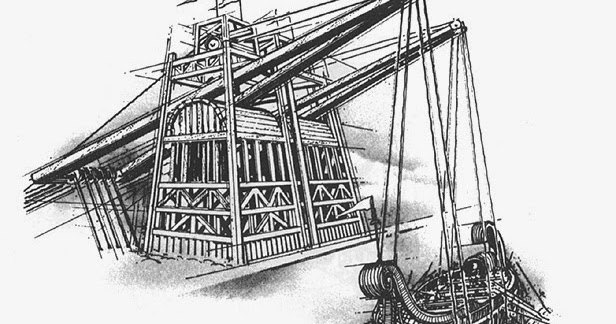
What became of Archimedes? It is said that Marcellus ordered his soldiers to take the inventor alive, but when a Roman soldier stumbled upon Archimedes he was working on some mathematical problem and refused to get up immediately, instead insisting on finishing his work. The Romans did eventually take Syracuse – by exploiting a weakness in one of the land-facing defensive walls while the Syracusans were busy celebrating a religious festival. The Romans at least, strong as they were both by sea and land, had every hope of capturing the town at once if one old man of Syracuse were removed but as long as he was present, they did not venture even to attempt to attack in that fashion in which the ability of Archimedes could be used in the defence.”

“Such a great and marvellous thing does the genius of one man show itself to be when properly applied to certain matters. Polybius, the great historian who recorded Rome’s rise to power, commented in his Histories: As the Roman commander Marcellus wryly remarked, “Archimedes uses my ships to ladle sea water into his wine cups”. These triumphant inventions broke the Romans’ courage and arguably prevented them from attempting an all out assault on Syracuse. Whenever a Roman ship approached, one of these cranes would be positioned over the top of it, and a pulley used to release massive stones or lead from its front end, which would come crashing down, destroying the ship and everything it was carrying (particularly its siege towers). He also invented crane-like machines that could be extended way out over the top of the city’s walls, and swung around in an arc. He also created smaller catapults so that the Syracusans could still target the Romans when their ships were close to the city walls. Quite the opposite – he applied his incredible knowledge and understanding to real problems.Īrchimedes improved the design of the city’s catapults, enabling them to target the Romans further away and with better accuracy. And he did it brilliantly, proving he was no theoretical mathematician with his head in the clouds. By then in his seventies, Archimedes’ significant brainpower was called on to help the Syracusans defend their city. And by no small amount this was due to Archimedes.

Syracuse held out against the Roman siege for months.

Rome decided to make an example of those who sided with Hannibal and sailed with its fleet to blockade Syracuse. At that time, Hannibal was wreaking havoc through Italy with his forces, after having crossed the Alps with the help of elephants. The politics were complicated, but essentially the ruler of Syracuse had been caught betting the wrong way – he had sided with the Carthaginian general Hannibal against the Romans. In 213–212 BC, the forces of Rome laid siege to Archimedes’ city of Syracuse. A stone bust of Greek thinker Archimedes.


 0 kommentar(er)
0 kommentar(er)
